The ‘money wife’, a barbaric tradition in Cross Rivers robbing underage girls of their childhoods, turning them into sex slaves
A barbaric tradition known as “Money wife” in a remote village in Cross river state called Becheve where girls as young as 10 years old are being sold into marriage has been uncovered.
Editor's note: here is another related story.
A Twitter user by name Tunde Onakoya who runs a Non-Governmental Organisation running a program called Chess In Slums Africa that opens doors of opportunities and education for marginalized kids through chess, brought this to light.
Having learned about this tradition via a cinematographer who was on a job in a community in the state where this act is perpetuated, Onakoya decided to see things for himself by traveling down to learn more about how these girls are being robbed of their childhood and how he can eradicate this tradition.
“It all started back in march this year, when a cinematographer sent a video to me on twitter which properly detailed the stories of some of the victims of this barbaric act, and asked that we considered it as our next project for @chessinslums,” he began.
“The video broke me. I spent the next few days doing extensive research on the “Money Wife” practice in Becheve and I was utterly shocked and enraged by some of the discoveries I made. It was the first time I had ever heard of such practice in Nigeria.
“I knew we needed to do things differently if we were ever gonna have a chance at fundamentally solving this problem and saving these girls.
I told the team @chessinslums about it and we started working on staging an intervention.
“Let me delve into some of the things we learned:
The Becheve tribe of Obanliku LGA in Cross river state is made up of 17 villages all of which practice the Money wife tradition. It's located just beyond the famous Obudu hills with a population of about 100,000 people.
“The ‘money wife' is a custom in which a girl child in the community is sold out to a man by her parents as a wife in exchange for money as little as 5,000 naira (10 dollars), food items, or to pay a debt.
“How it really works is that a “rich” man in the village is approached for a loan that is to be repaid by handing over a daughter to him. In the case of the unavailability of a daughter, the lender waits till they have one.
“So most debts are incurred before the girl child is born. This practice ensures that once a girl becomes a ‘money wife,' she is considered dead by her family and must not return irrespective of how she is treated by her husband or his relatives.
“It gets worse…Upon the death of the man (In most cases, the girls are married off to old men in their 60-90s), the girl is given to his next of kin as a wife.
“If the ‘money wife' dies without having a child, her parents are obligated by tradition to give another girl child as replacement.
“The girl is surrendered to the lender as a wife to use as he pleases. The girl will have no rights and her opinion is not sought in the matter as she is practically enslaved and put to work on farms which they cultivate for their husbands. She is not allowed to get an education.
“The men in Becheve cherish this practice as a status symbol as it earns them acclaim amongst their peers.
“For the innocent girls, their entire childhood is stolen from them and their existence reduced to being mere sex slaves. The physical and psychological trauma that these girls have to face is something we can never fully understand.
“We have failed these girls as a society. We are far too disconnected from the realities of children in places like this. Yes, all of this is happening in 2022.
“Now, a few organizations, NGOs and civil societies in the past have tried to advocate for these girls. There was even a BBC documentary sometime in 2018 spotlighting this barbaric act of child abuse,but sadly very little has changed.
“The ‘money wife' practice in Becheve is a cultural issue that is so deeply ingrained in poverty and can only be challenged from within the system. Outsiders attempt to intervene, but are hindered by a cultural ideology.
“I spent months obsessing about what we could do differently. Ending child marriage in communities like this is a very delicate subject that could worsen the experience of the victims if you sell them false hope of saving them without considering a Holistic approach to intervening.
“When the hashtags fizzle out and the outrage dies down, the girls are still left by themselves with their abusive husbands who may even become more violent to them for being rebellious. Having good intentions is not enough, it might even reinforce the status quo.
“After several months of putting a plan together with the @chessinslums team, I was finally convinced that we had a chance at saving these girls.
“Five days ago, I finally booked a flight to Cross River state for the first time in my life to assess the situation on ground. Actually, we had to fly to Enugu first and make the rest of the trip by road as Becheve is an 8 hour drive from the airport in Calabar-the capital of Cross river state. That was too much time on the road with the insecurity issues in the country. It took us four hours from Enugu.
“We had established contact with a Man called Pastor Richard, a missionary who has lived in Becheve for over 30 years. He was the one that first brought the world's attention to this and has continued to fight against this tradition till date.
He has rescued over 50 girls.
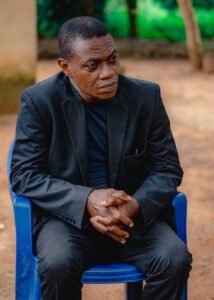
Pastor Richard
“We got to the Obanliku local government around 8 pm and lodged in a nearby hotel. We had scheduled a meeting with some of the community clan heads the next day to speak to them about our plans for their people.
“We set out by 8am the next day to the residence of the paramount ruler of the community to seek his blessing and permission.
“After a long drive to the Paramount ruler's home, we finally met him and told him of our plans for the community and asked for his blessing. He welcomed us very warmly and offered us kolanut as a sign of peace and acceptance. We also offered gifts and took pictures with him.
“Our next drive was to the Utanga village to meet with the Clan heads and village chiefs. This was going to be a lot trickier as we were fazed with a dilemma to either be diplomatic with our approach or just come straight with our intention for the girls.
“Pastor Richard suggested that we maintained a diplomatic approach to engaging the clan heads as talking about the money wife practice could make them apprehensive and deny us access to their people.
“The meeting with the Clan heads was very tense at the beginning but something very interesting happened as the conversation progressed.When we mentioned that the chess project was to be just for the young girls, one of the elders immediately asked us if it was for the ‘money wives'. I said Yes.
“Deep down, I knew we couldn't really achieve anything without the full cooperation of the community leaders. There was deafening silence for a moment. The man sighed and said he had suspected that was our intention
“To our surprise, all the village chiefs and clan heads committed to giving us all the support we needed to abolish the practice in the village. The chiefs started narrating how their mothers were also victims of this age long tradition and how it was no longer a thing of pride but a necessity borne out of extreme poverty where the families are left with no choice but to sell their daughters.
They wanted it to stop too.
“I couldn't believe my ears. Everything felt like a Nollywood movie dated back in the 60s. The chiefs gave us their blessing and we took pictures.
Pastor Richard mentioned that in all his years of being in the village, he had never seen the chiefs be so vulnerable and open minded.
“Our next stop was the Ugbakoko village where we had to walk several miles to meet with another community leader who was very influential amongst his people. We got his blessing and he gave us permission to use the town hall for our training session with the girls.
“Finally, we met the girls. The stories were horrible. Just horrible. Girls as young as 5-15 years old were already married or sold to men old enough to be their grandfathers. There were a lot of 14-18 year old girls who had kids already.
“You can't make this up. Everything I had read about was real. I met Faith, now a 20 year old girl with 3 children. Abandoned by her husband and now left to fend for herself and children.
All she ever wanted was to go to school and become a nurse.
“I met Dorathy who was now 27 years old with 6 children and a life filled with pain and extreme suffering. She had her first child at the age of 13.
She told me she had contemplated committing suicide a few times but needed to stay alive to take care of her children.
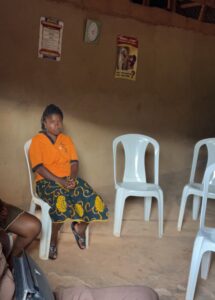
Dorathy
“I met Goodness who was just 9 years old but could read and speak English fluently. She had to drop out of school recently and has been sold as a money wife to an old man from a Neighboring village. It is only a matter of time before he comes to claim his.
“I met all the other girls who have been sold as money wives by their parents, dropped out of school and we're waiting in agony for the husband to come claim them. They knew the names of their husbands already.
Some of the underage girls
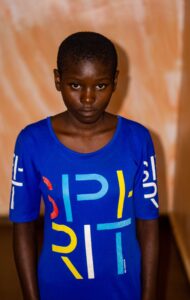
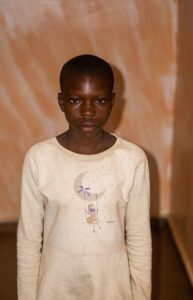
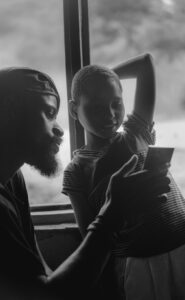
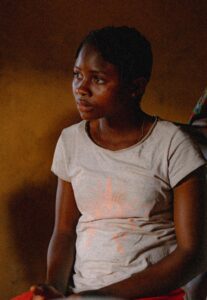
“Many of the girls had tried to runaway but mentioned that there was a charm called “Olembe” that is used to kill or harm any money wife that tries to escape the marriage.
A lot of girls have lost their lives during childbirth and many currently live with obstetric and vesicovaginal fistula.
“This was a true humanitarian crisis.
An entire community blinded by ignorance into sheep mentality of even condoning the abuse of girls in this manner.”
A Plan Of Action
“I know you feel a lot of rage right now, I feel the same way too. An outrage is not sustainable, we need to take practical steps to save these girls.
“I'm back in Lagos now but we'll be returning to Becheve in a couple of days with a team of 20 people.
This is our plan:
1. With Pastor Richard's help, we're creating a database for women between the ages of 18-40 who are money wives and already have kids. We are going to pair them up with a support system of female mentors where they can get monthly stipends to support their farming business.We are going to put out a form for people to apply to be female mentors for these women. You will have to commit time to speak to them monthly so they know they're not alone in this world.
2. We have selected 50 girls between the ages of 5-18 who are money wives across all the Becheve villages and we will camp them in Ugbakoko for two weeks to teach them chess, mentor them and create a safe space where they can talk about their ordeals. We'll also need to partner with organizations leading the advocacy to end Gender based violence and early child marriage in remote communities. Please send email to : [email protected]
3. In our time in the community, we will go from house to house to educate the families about this barbaric act and do our best to eradicate this primitive mindset amongst the young men and the families selling their daughters.
4. We will partner with financial institutions to offer loans to the people of Becheve as an alternative to using their daughters as collateral. Poverty and high levels of illiteracy is the major culprit here.
The local school in the community is dilapidated. We will renovate it and place all the girls on educational scholarship support. We will also partner with other schools around and get as many girls as possible back to school. We will host a chess tournament and community event at the end of the 2 weeks training camp so the girls can showcase their talents to the entire community.
We will invite all community leaders and villagers so they can come watch the girls show intellectual prowess.
5. We will make sure all the village heads commit and sign to a law that criminalizes the money wife tradition in Becheve and get the police to enforce this law.
6. We will set up a permanent training centre (Safe space) in the community where the girls can continue to learn chess, introduce them to a world of technology and build a library where they can read new books and learn about the world beyond the confines of Becheve.
7. We will renegotiate the deals for the money wives under the age of 18 and pay back the debt their families owe to the lender.
8. We will do all of these things whilst simultaneously running a global campaign to end child marriage in Africa.
“WE WILL NOT LEAVE BECHEVE UNTIL SOMETHING CHANGES.
“It will be very shameful if we reduce this to gender wars on twitter. We all have a responsibility to those without a voice. Let us all become duty bound and show up for these girls in every capacity.
“I hope the government intervenes too. It will take time but we won't give up. Culture is no excuse for child abuse. It is time to do great things from a small place.”
To donate to this initiative, one can donate to the project here:
0491316991 Gtbank
Chess in slums initiative.
If you're outside Nigeria, you can donate to our Go fund me: https://t.co/xn17IMBiGa
This “Eyes on Trafficking” story is reprinted from its original online location.
 ABOUT PBJ LEARNING
ABOUT PBJ LEARNING
PBJ Learning is a leading provider of online human trafficking training, focusing on awareness and prevention education. Their interactive Human Trafficking Essentials online course is used worldwide to educate professionals and individuals how to recognize human trafficking and how to respond to potential victims. Learn on any web browser (even your mobile phone) at any time.
More stories like this can be found in your PBJ Learning Knowledge Vault.
EYES ON TRAFFICKING
This “Eyes on Trafficking” story is reprinted from its original online location.
ABOUT PBJ LEARNING
PBJ Learning is a leading provider of online human trafficking training, focusing on awareness and prevention education. Their interactive Human Trafficking Essentials online course is used worldwide to educate professionals and individuals how to recognize human trafficking and how to respond to potential victims. Learn on any web browser (even your mobile phone) at any time.
More stories like this can be found in your PBJ Learning Knowledge Vault.
